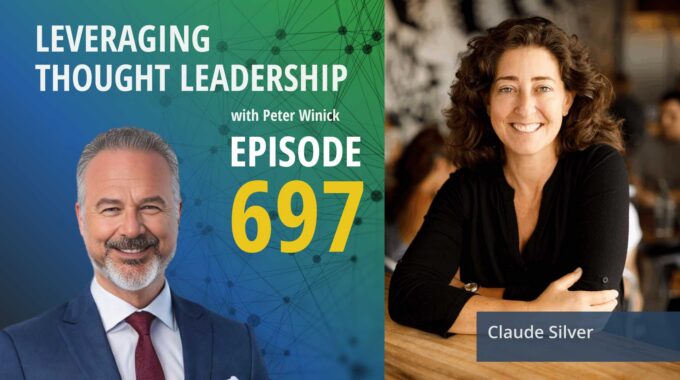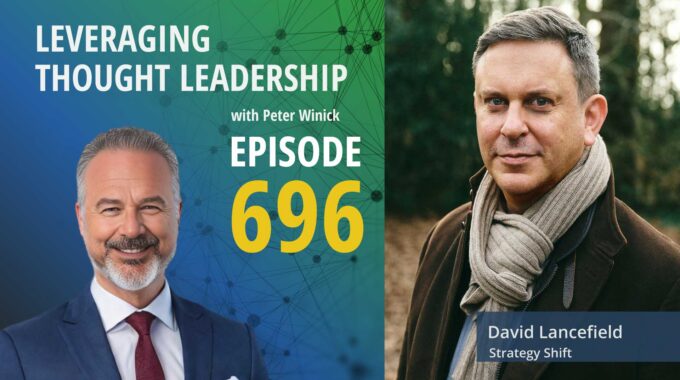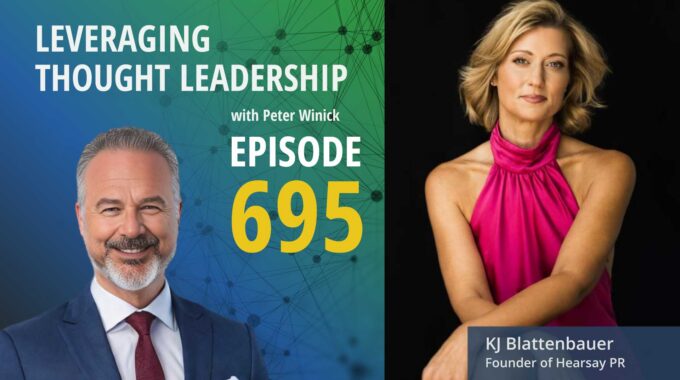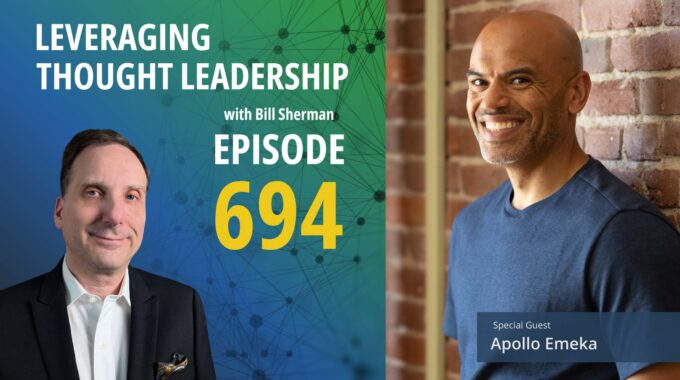Frameworks for connection, accountability, and performance This episode examines how psychological safety drives performance, how…
Marketing and Product Roadmaps for Entrepreneurs | Stephanie Chandler
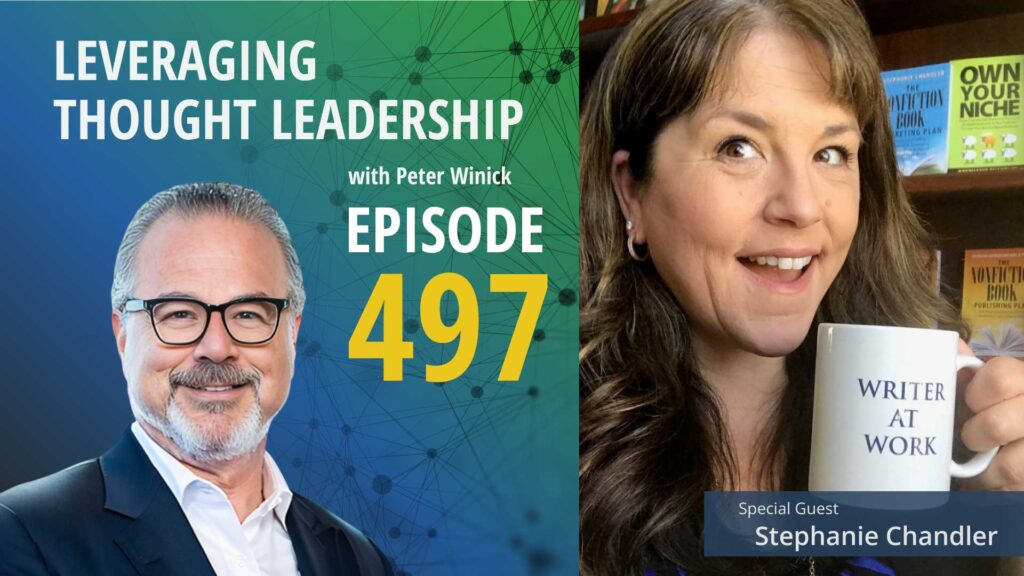
Getting the most out of your book as an entrepreneur.
An interview with Stephanie Chandler about creating a marketing plan for your book and developing additional connected products.
Ever thought about writing a book to support your thought leadership?
Or maybe you have already written a book – and now you’re trying to get the word out!
Either way, a book can be an incredible investment for an entrepreneur, but to get the full return on that investment, you’ll need a marketing plan and a product roadmap.
Today, we’ve invited Stephanie Chandler to be our guest. Stephanie is an experienced consultant, specializing in content marketing, internet marketing, social media, search engine optimization, and publishing. She is also the founder and CEO of Stephanie Chandler Enterprises, and the author of The Nonfiction Book Publishing Plan and The Nonfiction Book Marketing Plan.
We start our conversation by discussing the huge changes in the publishing industry during the last few years. Stephanie shares that physical books are still being read (as well as a surge in e-books), but sales of audiobooks are rising, and expected to grow exponentially through 2030. In addition to audio, self-publishing has exploded – bringing more than 1 million titles to the market each year!
With so many books being published, having a strong promotion strategy has never been more important. But what does that look like? Stephanie walks us through the best methods to include in your marketing plan, from podcasts and Amazon promotions to book tours and speaking gigs, as well as giving us surprising insight into one method that might not work as well as you think!
In addition to promoting the book, entrepreneurs will want to create additional products to support that book, and give customers something to put into practice right away. Stephanie shares insights around workshops and webinars, and explains an underutilized method that can actually make more money than your book – with less effort! Be sure to listen in!
Three Key Takeaways:
- Well-written, well-produced, and well-promoted books will always rise to the top.
- Social media isn’t a great way to sell books. It’s great to build a platform and your e-mail list.
- To give your book the best chance of success, spend as much time on preparing the promotion strategy and supporting materials as you do in writing the manuscript
If you need a strategy to bring your thought leadership to market, Thought Leadership Leverage can assist you! Contact us for more information. In addition, we can help you implement marketing, research, and sales. Let us help you so you can devote yourself to what you do best.

Transcript
Peter Winick And welcome, welcome, welcome. This is Peter Winnick. I’m the founder and CEO at Thought Leadership Leverage and you’re joining us on the podcast today, which is Leveraging Thought Leadership. I’m really excited about today’s episode. Today’s guest is Stephanie Chandler. And let me give you her background, because it’s really cool. So she was a corporate person in Silicon Valley for ten years. Then she opened a bookstore. For those of you under 35 Google that term, it used to be a place you went to buy. Analog representations of what’s now on Kindle, and shopping is fairly large. 2800 square foot Bookstore published a book in 2005, and since then she is the founder and CEO of Stephanie Chandler Enterprises, which consists of the Nonfiction Writers Conference and Nonfiction Writers Association and Authority publishing. So without further ado, welcome.
Stephanie Chandler Hey, Peter, so fun to be with you today.
Peter Winick Cool. So you have been around this nonfiction universe primarily from a from a book angle for quite some time, right? Give me sort of the short version of what is universal? What’s the same today as it was when you sort of started and what’s totally different? Oh, boy, that’s a tough question.
Stephanie Chandler Maybe it was the same today. I mean, people still are reading books, thank goodness. Right. And we’re afraid print books are going away. Well, they didn’t. Yeah. So that’s good. What’s different? Something I love is that we’re moving toward audiobooks more and more. I love them. I listen constantly. It’s another way I can squeeze in reading time into my day while I’m taking a walk or doing the dishes or laundry.
Peter Winick I don’t mean to interrupt you. Give me some numbers on that. So personally, I’m a book guy. I read books a week, but that is not normal. And I just I don’t. I can’t. I love podcasts, but audiobooks just don’t do it for me for some reason. And I don’t know why it might be my brain is for I don’t know. It just my thing. But. Any.
Stephanie Chandler Yeah. The market is expected to grow. If I’d known you’d ask me for stats, I would have had them in front of me. But I would ask you is. And it’s expected to grow exponentially through 2030. So it’s really growing by leaps and bounds each year. And I’m with you. It took me a while to really fell in love with audiobooks. I think that it’s important to pick topics that you’re really, really interested in, and I it helps me when I like the narrator. So a lot of times if the narrator, the author like a James clear, you know, something like that that you’re interested in hearing from, it feels like a personal, you know, connection, kind of like podcasting does.
Peter Winick Hmm. Interesting. So I don’t mean to cut you off there, but I had to ask the question. So tell me what else you were saying in terms of what’s stayed the same and what hasn’t, what’s true.
Stephanie Chandler Yeah. So what hasn’t changed? I mean, the audio audiobooks are on the rise. eBooks didn’t explode the market, thank goodness, but they’re great too. I love my Kindle. You know, I’m a former bookstore owner. I still love my physical books, but Kindle search makes it easy to go on vacation and bring a bunch of options.
Peter Winick Right?
Stephanie Chandler And so and self-publishing has obviously exploded. We’re releasing a million titles a year. Peter. It is incredible. And it’s concerning because it’s harder and harder to make your book stand out when there’s so much noise out there.
Peter Winick Yeah, I mean, a million a year. I mean, that’s amazing and frightening at the same time, Right? Right. It’s great that, you know, on the one hand, anybody that wants to write a book can it’s horrible that anybody that wants to write a book can hate. So that and I think what that does is when you look at some of the listing things, it’s just so much more crowded. It’s so much more difficult. And I think, you know, a lot of the work that we do is getting folks to be practical and pragmatic around outcomes and expectations on the back end of a book, you know, but if there’s a million books out there, guess what? They’re all not going to be New York Times, The Wall Street Journal bestsellers, just not going to happen.
Stephanie Chandler So true. And you know, the good ones rise to the top. Yeah. So let’s be clear about that. You’re right. It’s hard to market books. That hasn’t changed. That will always be true. But well-written, well-produced, well promoted books will rise to the top. But they have to have those three things in common. They have to be well-written.
Peter Winick And, you know, but so I agree with that. But how do you define well promoted? Because if you ask ten different book promotional people that question, you get 11 answers.
Stephanie Chandler Well, I mean, you have to have a marketing plan. Right. I know you guys do a lot of that work with authors. I think that’s so important. Your book will not be discovered on its own. It has to have a marketing plan. I like podcast media, Amazon ads. That’s a huge opportunity right now, their pay per click ad program. So you really have to have a strategy to create an audience and promote to them. And hopefully you’re doing that on long term. And I think you probably work with a lot of entrepreneurial authors who are using their book to build a business. That’s a great reason to write and promote a book because, you know, you can justify spending investing in marketing when you’re actually not just counting on book sales, but you’re turning that into bigger revenues.
Peter Winick So stay there for a minute because I think you’re thousand percent right. So on the one hand, just straight up book math or book economics, number of units sold time, some level of contribution or profit per book equals X is for most people, most of the time X is a negative number, period.
Stephanie Chandler Dismal.
Peter Winick Dismal. And that doesn’t take into account the non-direct book cost like your time, like opportunity costs, like PR, like whatever. Now that being said, the real the real way you know that I think you should do sort of book economics is number of units sold whatever it’s a loser right. Let’s just assume you’re going to lose and put a finite number on that. I am willing to invest $50,000, whatever it is in this book. Where do I plan on making that up? That’s the question, right? So you really have to have that product roadmap very well thought out. And in order to do that, you have to know who your clients are. And in order to do that, you have to have a strategy in place. Right. And I find far too many people that that I talked to early on in the journey. And it’s like, Oh, yeah, my book is coming out in four months. Okay, great. Tell me about the plan I tell you about. And the plan is mostly why they wrote the book. What’s in the book? And I’m not by any stretch discounting the value, the importance of high quality content. But then I’m like, okay, well, what’s the business model? If somebody opens this book, the right person gets this book and falls in love, what’s next? And I get this. They’re like, Huh? I’m like, okay, if you can’t answer that question, don’t publish the damn book yet because you can’t go back to answer that question a year or two later. I mean, you could, but it’s not effective. So yeah, you see that as well.
Stephanie Chandler I do. And I think that a lot of authors should be focusing on that revenue plan. So is it going to be consulting? Is it going to be speaking right? Is it going to be selling products and services? You know, I’ve worked with so many authors in different fields in a former Microsoft executive who sends 50 copies of his book out per month to his prospective clients, and it has exploded his consulting business. So there’s lots of ways. Having a book opens the door to speaking, and a lot of people want to establish themselves as thought leaders, as influencers. And a book is one of the best ways to do that.
Peter Winick If you’re enjoying this episode of Thought leadership leverage, please make sure to subscribe. If you’d like to help spread the word about our podcast, please leave a five-star review at ratethispodcast.com/ltl and share it with your friends. We’re available on Apple Podcasts and on all major listening apps, as well as at thoughtleadershipleverage.com/podcast.
Peter Winick So give me an example of the types of products, obviously coaching, consulting, whatever, but what other things that you’re seeing now that are, that are different or interesting?
Stephanie Chandler You know, what I love are the workbooks. We’re seeing a lot of companion workbooks, and this goes along well with online courses, which can be a great revenue generator for influential people, online courses, membership programs. So those are some things that work really well with your books. And I love to work, but personally, I’ve got one that’s coming out about marketing right now, and I think it’s an under-utilized opportunity for authors to cross-promote within other programs that they’re offering.
Peter Winick So can you go a little deeper there? Because I think some people get confused when it comes to work, but because they’ll write a book and in the book there might be a set of questions, activities, things to do. Give a good example, because I think about it, I think the way that you do is it is a companion to the book that is much about the learning experience. But maybe if you give an example or unpack like what it is and what it is, it.
Stephanie Chandler Yeah, well, a lot of times authors are just pulling those questions out and turning them into a workbook, right, with some journaling space, but you might go a little bit deeper. When I created my own workbook, I created it while it was creating a companion course, so it really helped me to keep it in a logical order. It stands. Loan. So it really depends on what you’re teaching and what it is you want your audience to do. And my intention with the workbook is not only is it used in the course I teach, but it will be a standalone product that will promote the course, right? Peter So it’s got to.
Peter Winick Be there for a minute as a standalone because now, now it’s not just because some people think, Well, if I can’t sell any books, why would I sell a workbook? Because that’s only applicable to a subset of the people that bought the books. That’s not true. The book is yet another what I would call a front door. Maybe I don’t read your book. Maybe I just want to do the activities right, and maybe you can package that. And I think, you know, the dirty secret behind workbooks is if you’ve written the book, you’ve probably 90% of the way there, maybe 80. We could debate that whatever to write the workbook.
Stephanie Chandler Correct. And it’s a lot less content than your book is. A lot of blank spaces, a lot of fill in the you can extract those worksheets, make them a bonus download, like there’s tons of ways to leverage a workbook. It’s also a bundle. So if you’re selling at the back of the room, you just went from a $20 sale to a $50 sale because not only that, we can price workbooks with a higher price point. For whatever reason, there’s a higher perception of value within a workbook, and you tend to see those at $30 versus maybe a $20.
Peter Winick And that, I think, is part of having a good strategy, is understanding things that at first blush to an outsider, don’t make sense. It’s like, wait a minute, I wrote this book. It’s, you know, 60,000 words, 30 or 40 pages, and it’s 2495. The workbook is, in essence a derivative with a lot more air in it. That’s maybe 30% of the content, yet it sells for 50%. Like that doesn’t make sense. It doesn’t matter if it makes sense. That’s the market.
Stephanie Chandler That’s how it works is how this market. And if you look at some of the top bestselling authors, this is what they do to get another book in the marketplace. You know, James Clear has done it. Lots of people have done this in because their audience wants more and they’re maybe not prepared to write their next book. So they extract some content out a few questions. It becomes a work.
Peter Winick But give me a couple of interesting creative maybe out there, things that you’re seeing folks do on the marketing side, because again, with a million books out there, you got to put your hair on fire to get attention. What are some of the cool things that you’re seeing people do that are that are thoughtful and clever?
Stephanie Chandler One of my favorites is authored in Mark Paul is so he is a real estate investor, has no platform, no no social media presence whatsoever. He wrote a memoir about how he bet on a horse to win the Kentucky Derby back in the eighties, and he won a seven figure prize and didn’t realize he had to go collect it from the Mexican drug cartel. So it’s a memoir, right? It’s a memoir that reads there’s.
Peter Winick That.
Stephanie Chandler Called The Greatest Gambling Story Ever Told. So Mark went out and said, I’m going to go all in on Amazon ads. And I’m like, Well, that’s great. I like them. But, you know, I think you’re going to be underwhelmed. He has sold 35,000 copies of that memoir, Peter, using nothing but Amazon ads. He’s in the middle of negotiating a movie deal, like all kinds of amazing things have happen as a result of that. So I thought that was great. And then we had another client hit that back.
Peter Winick I have to stop. Why did he have to redeem his Kentucky Derby ticket through the Mexican cartel?
Stephanie Chandler Yeah, that’s where he had places that this was back in the eighties. And like Tijuana, I mean, it’s a great story.
Peter Winick Really a fun note to folks at home. Go to like DraftKings and not the Mexican.
Stephanie Chandler Yeah, well.
Peter Winick No offense, Mexican drug cartel if you’re listening.
Stephanie Chandler Right? But I also work with Karen Gordon. So she wrote a leadership book for three chairs, and then she put a really long runway on a preorder on Amazon. And I thought this was an interesting strategy. So it was like four months in advance. She promoted the hell out of her book, and the week it launched on Amazon, it went to number two on Wall Street Journal bestseller lists. So that’s a win. And she did a lot of promoting during that long runway of a presale. And that’s how presales work on Amazon. They count the week that it goes live.
Peter Winick Interesting. Good stuff. Good stuff and anything else. Or actually, let me ask you the flip side of that question. What are you seeing now that used to be money in the bank That just doesn’t work.
Stephanie Chandler You know what I’ll say? I think social media has been overly hyped. I don’t think it’s a great way to sell books. I think it’s a great way to get people on your email list to engage with your audience. But I wouldn’t say go out there and put your buy my book, add up on your on your Instagram account. I don’t think that’s what’s going to happen unless you happen to have a million followers. And even then you’ll be lucky to get a thousand sales because the percentage of buyers is going to be so low. So, you know, social media is great for what it does, but it’s not a sales tool.
Peter Winick Got it. And I would add to that list, the old school book signing tours are.
Stephanie Chandler The I hate those. Don’t go set in a bookstore. And I’m a former bookstore owner, and I can tell you it is the worst way to sell books. I would much rather see you go on a speaking tour.
Peter Winick Exactly.
Stephanie Chandler Another. I’ve got another great example for you. Charmaine Hammond put herself on a speaking tour for her book about her dog, Toby, and she decided to call it I think it was like the Happiness tour. She reached out to her whole network, every all the clients, all the peers, all the friends and said, I’m going to be on this like three month tour and come into your city. I don’t know how many states she went to, like five states. She got a local RV company to sponsor a free RV. She got a she got the vehicle wrap around the entire RV. She got sponsors in every city she spoke in, in office, break rooms, pets, food supply stores, all her network, her tribe of influencers, I like to call them hooked her up, got her speaking gigs. She sold a ton of books, had every bit of it paid by corporate sponsors. Was brilliant.
Peter Winick I love it. I love it. I love it. Any other As we start to wrap here, words of wisdom. No pressure, but who’s out there now? There’s some there’s definitely people out there now thinking about, but I want to do this book thing and listen, I love books. What would you advise that person that really is so passionate about? I want to write a book. I want to write a book. What would you tell them so that they do it in a way that is more beneficial than it might be?
Stephanie Chandler Two things. Number one, be super clear about your target audience. This is one of the biggest mistakes I see authors make. They don’t know who they’re writing for. They don’t know what their audience cares about. They just want to tell their story. Number two is what is the goal? What do you want the book to do for you? Do you want to be a speaker? Do you want to sell consulting? Do you want to build some sort of business around your book? Or are you just doing this for fun? And that’s a whole different thing. But if you really want the book to sell, if you want to benefit from it, from a business perspective, you have to know your audience to write for them and you have to have a plan.
Peter Winick Got it. Got it. Love it. Well, I appreciate your time. Appreciate your insights. Great stuff. And thank you so much for spending some time with us today.
Stephanie Chandler Yeah, thanks for having me, Peter.
Peter Winick Thanks. To learn more about thought leadership leverage, please visit our Web site at thoughtleadershipleverage.com to reach me directly. Feel free to email me at Peter at thoughtleadershipleverage.com and please subscribe to leveraging thought leadership on iTunes or your favorite podcast app to get your weekly episode automatically.


